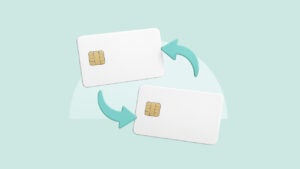Can a credit card be canceled after being approved?

Key takeaways
- You might be able to cancel a credit card application right after applying if the credit card issuer hasn’t completed processing it yet.
- If you’ve already been approved for the card, you’ll probably need to cancel your new card just like you would any other card.
- Before you cancel your new credit card, consider potential consequences, such as the impact on your credit utilization and credit scores.
When you apply for a credit card, the decision is usually almost instant. This can be convenient — unless you realize you don’t want the card after all.
Also, keep in mind that you will lose any welcome bonus you had your eye on. Issuers tend to frown on those who open and close their accounts within a year or less after acquiring it to prevent a practice called card churning.
What Might Happen If You Cancel Your Card Immediately After Approval
Before you cancel your newly approved credit card, make sure you understand what will — and won’t — happen if you take this step.
Your credit score could still drop
Before approving you for a credit card account, your issuer would have made an inquiry into your credit score. This sort of hard inquiry has the effect of lowering your credit score. It signals that you are likely going to take out additional credit.
The new credit that you would potentially take on introduces some uncertainty for lenders since it’s not clear what brought about the need for this credit and how you will handle it. That’s why a hard inquiry has a negative impact on your credit score.
Also, if a number of hard inquiries are made because, say, you are looking to open more than one new credit card account, that will have a bigger impact than a single inquiry.
Canceling a card right after you’ve been approved won’t remove the hard inquiry from your credit reports. The damage to your credit will remain. Luckily, you’ll usually only use a few points. That said, the impact might be greater for people without much credit history.
You’ll miss out on lower credit utilization
In addition to avoiding a negative credit score fallout, even if it’s a minor one, you could also enjoy a positive credit score impact by holding on to your new card.
For one, it will boost the total amount of credit you have available to you, which will bring down your credit utilization ratio, or how much of your available credit you are using. Of course, this will hold good only if you are disciplined in not racking up additional debt on your new credit card.
If you cancel your new card, you’ll lose access to your new credit line — and any credit benefits that come with it.
What to do before you cancel
At the end of the day, you may still decide to go ahead and cancel. This may be because when you actually got your card in the mail, your terms turned out to be not exactly what you expected. Perhaps the actual credit limit is different, or the annual percentage rate doesn’t appeal to you. You will find out such details by going through the fine print.
Even then, if you still want to hold on to the card, you could try talking to the issuer to see if you could negotiate the terms you’re not happy with. Also, if you change your mind about paying an annual fee, you could ask to downgrade to a different no-fee card from the same issuer.
If the issuer doesn’t negotiate with you, you will have to cancel the new card, much as you would any other card you hold.
How to cancel a card
The process of canceling a credit card you’ve just applied for can vary based on where you are in the application process.
How to cancel a credit card application that’s still pending
According to Capital One, one of the major credit card issuers, it’s possible to cancel a credit card application if it’s still pending. This includes:
- If you have applied at a bank branch or by mail, you can contact the issuer to cancel the application.
- Certain applications also go through manual review when you apply online. In this case, you might have time to get in touch with the issuer and let them know you don’t want the card anymore.
How to cancel a credit card application that’s been approved
If you’ve already been approved for the card, your only recourse is to cancel it like you would any other card. Here’s what you should do:
- Pay off any outstanding balance on the card and verify that there are no pending charges. That way, you can avoid the specter of residual interest.
- Call the card’s customer service number and talk to a representative about how to close your account.
- Make sure there will be no other fallout from this closure. For one, if this is a card that carries an annual fee, make sure you are not responsible for paying it.
- Keep a record of this interaction and ask for confirmation of the closure. The card issuer should send you a follow-up letter about the account closing.
- Check your credit report to see that the account has been closed.
The card issuer can also cancel a credit card at any time. It may not even give you notice about the impending closure, particularly if you have been tardy with your payments or not otherwise sticking to your card agreement. The closure may be also because you have not used the card in a long time or are not willing to agree to a change of terms.
The bottom line
If you decide you don’t want to hold on to a credit card after being approved by the issuer, you can still cancel your account. Think a bit about the consequences before you cancel. If you do decide to cancel, make sure to get a written confirmation of the account closing.
Why we ask for feedback Your feedback helps us improve our content and services. It takes less than a minute to complete.
Your responses are anonymous and will only be used for improving our website.






